Developing Professional Supervision Practice: A Comprehensive Report
VerifiedAdded on 2020/07/22
|27
|10153
|39
Report
AI Summary
This report provides a comprehensive analysis of professional supervision practices within the health and social care sector. It begins by outlining the principles, scope, and purpose of professional supervision, referencing relevant legal frameworks and codes of practice, including the National Minimum Standards for Care Homes and the Skills for Care Council. The report then explores various theories and models of supervision, such as the three-function interactive model, intervention analysis, and the developmental model by Erskine, highlighting their applications in guiding and supporting supervisees. The report also examines the legal requirements and codes of practice influencing professional supervision, emphasizing the importance of proper training, supervision, and appraisal to ensure quality and safety of services. Furthermore, the report delves into the findings from research, critical reviews, and inquiries that can be adopted for supervision, focusing on enhancing safety and improving employee performance. The report further discusses the ways in which professional supervision can protect individuals, senior support workers, and supervisees, covering performance management cycles, the use of performance indicators, and strategies for addressing power imbalances, confidentiality, and boundaries. Finally, the report includes practical examples of managing conflicts within supervision and gathering feedback from supervisees.
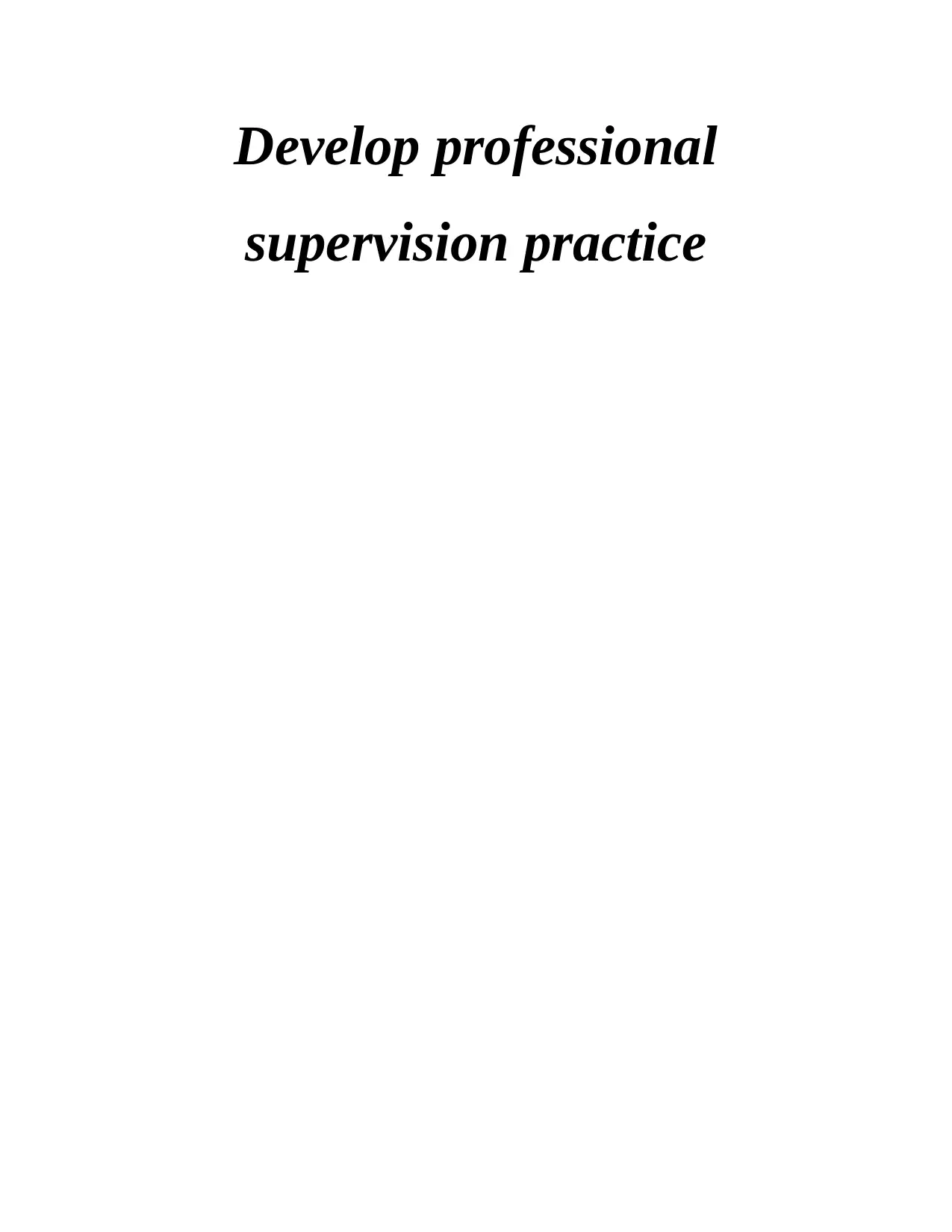
Develop professional
supervision practice
supervision practice
Paraphrase This Document
Need a fresh take? Get an instant paraphrase of this document with our AI Paraphraser
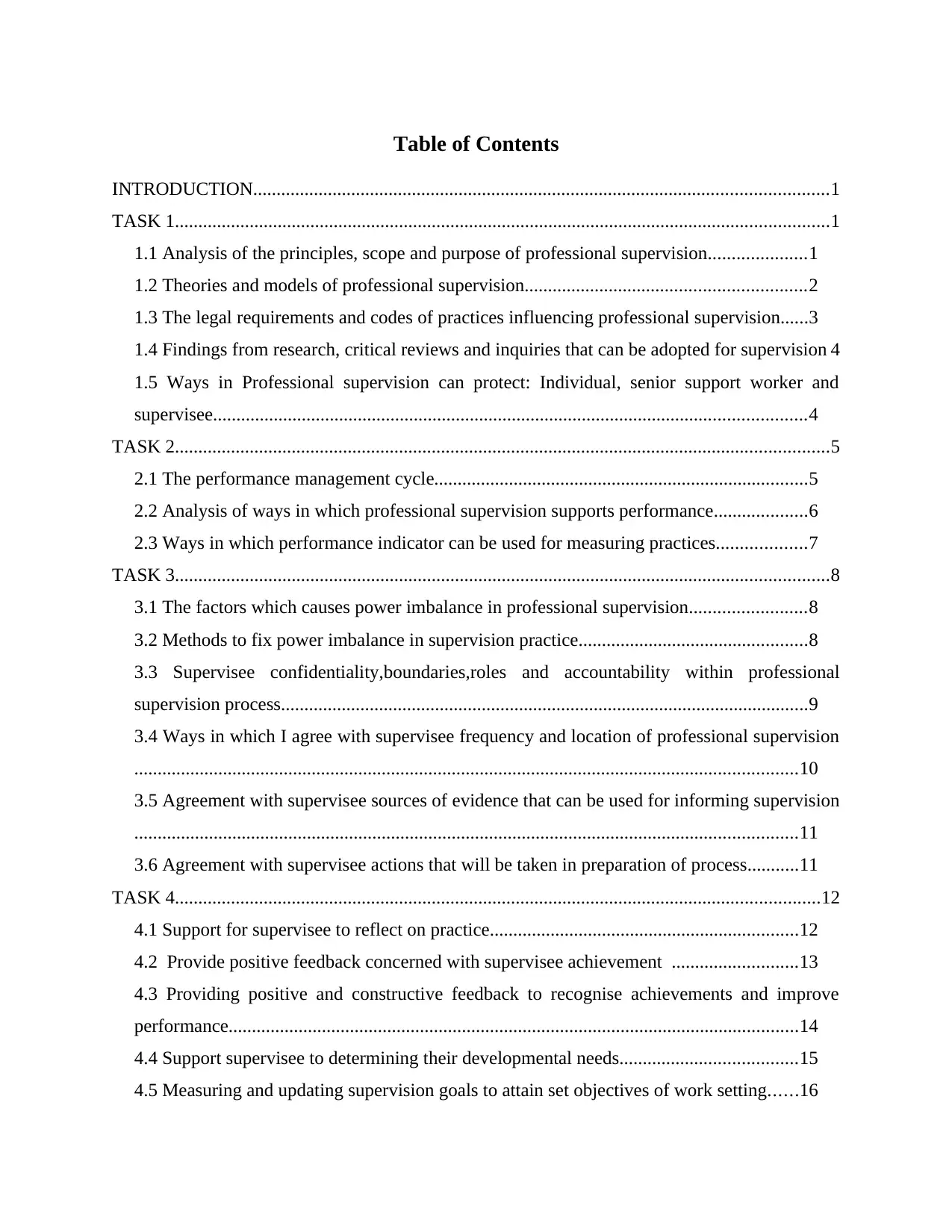
Table of Contents
INTRODUCTION...........................................................................................................................1
TASK 1............................................................................................................................................1
1.1 Analysis of the principles, scope and purpose of professional supervision.....................1
1.2 Theories and models of professional supervision............................................................2
1.3 The legal requirements and codes of practices influencing professional supervision......3
1.4 Findings from research, critical reviews and inquiries that can be adopted for supervision 4
1.5 Ways in Professional supervision can protect: Individual, senior support worker and
supervisee...............................................................................................................................4
TASK 2............................................................................................................................................5
2.1 The performance management cycle................................................................................5
2.2 Analysis of ways in which professional supervision supports performance....................6
2.3 Ways in which performance indicator can be used for measuring practices...................7
TASK 3............................................................................................................................................8
3.1 The factors which causes power imbalance in professional supervision.........................8
3.2 Methods to fix power imbalance in supervision practice.................................................8
3.3 Supervisee confidentiality,boundaries,roles and accountability within professional
supervision process.................................................................................................................9
3.4 Ways in which I agree with supervisee frequency and location of professional supervision
..............................................................................................................................................10
3.5 Agreement with supervisee sources of evidence that can be used for informing supervision
..............................................................................................................................................11
3.6 Agreement with supervisee actions that will be taken in preparation of process...........11
TASK 4..........................................................................................................................................12
4.1 Support for supervisee to reflect on practice..................................................................12
4.2 Provide positive feedback concerned with supervisee achievement ...........................13
4.3 Providing positive and constructive feedback to recognise achievements and improve
performance..........................................................................................................................14
4.4 Support supervisee to determining their developmental needs......................................15
4.5 Measuring and updating supervision goals to attain set objectives of work setting......16
INTRODUCTION...........................................................................................................................1
TASK 1............................................................................................................................................1
1.1 Analysis of the principles, scope and purpose of professional supervision.....................1
1.2 Theories and models of professional supervision............................................................2
1.3 The legal requirements and codes of practices influencing professional supervision......3
1.4 Findings from research, critical reviews and inquiries that can be adopted for supervision 4
1.5 Ways in Professional supervision can protect: Individual, senior support worker and
supervisee...............................................................................................................................4
TASK 2............................................................................................................................................5
2.1 The performance management cycle................................................................................5
2.2 Analysis of ways in which professional supervision supports performance....................6
2.3 Ways in which performance indicator can be used for measuring practices...................7
TASK 3............................................................................................................................................8
3.1 The factors which causes power imbalance in professional supervision.........................8
3.2 Methods to fix power imbalance in supervision practice.................................................8
3.3 Supervisee confidentiality,boundaries,roles and accountability within professional
supervision process.................................................................................................................9
3.4 Ways in which I agree with supervisee frequency and location of professional supervision
..............................................................................................................................................10
3.5 Agreement with supervisee sources of evidence that can be used for informing supervision
..............................................................................................................................................11
3.6 Agreement with supervisee actions that will be taken in preparation of process...........11
TASK 4..........................................................................................................................................12
4.1 Support for supervisee to reflect on practice..................................................................12
4.2 Provide positive feedback concerned with supervisee achievement ...........................13
4.3 Providing positive and constructive feedback to recognise achievements and improve
performance..........................................................................................................................14
4.4 Support supervisee to determining their developmental needs......................................15
4.5 Measuring and updating supervision goals to attain set objectives of work setting......16
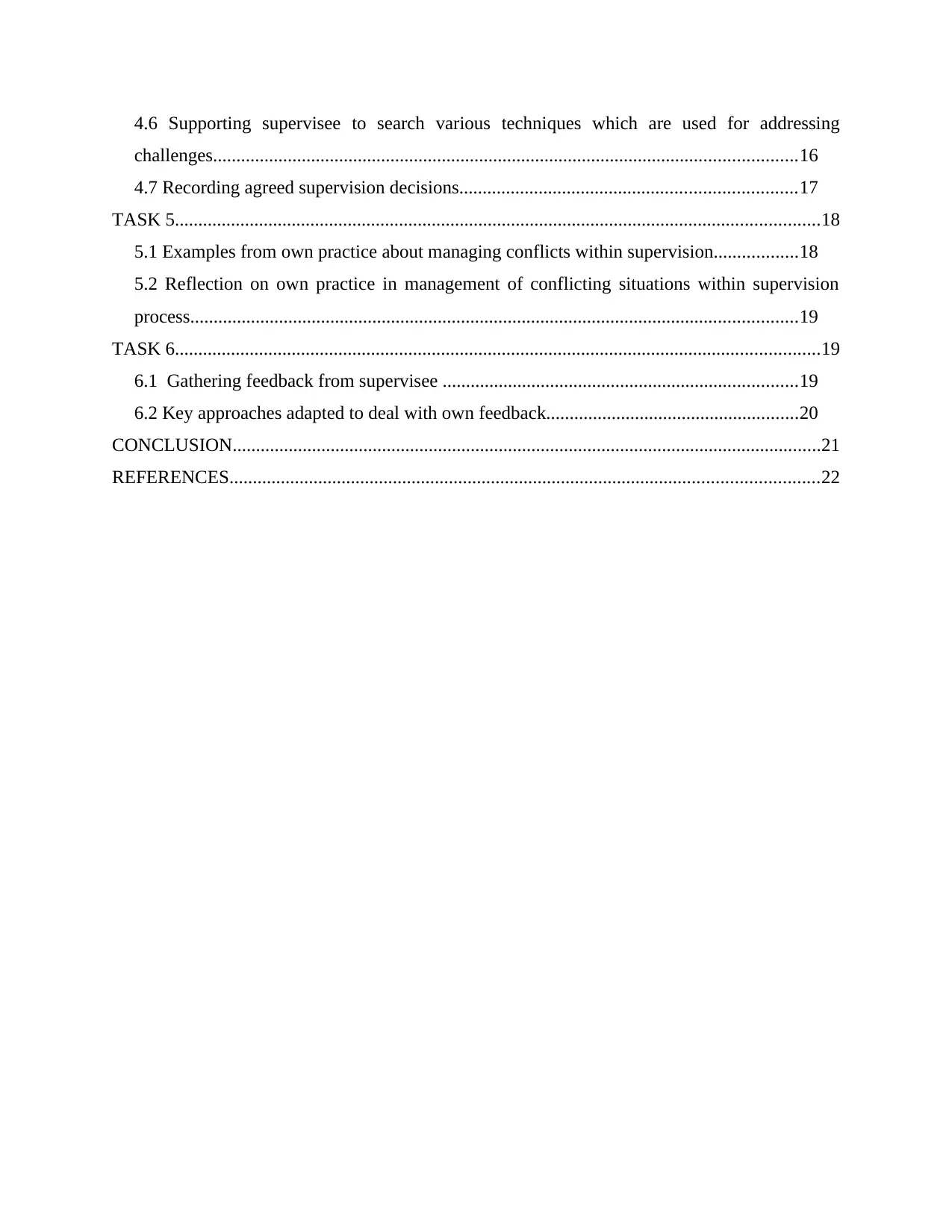
4.6 Supporting supervisee to search various techniques which are used for addressing
challenges.............................................................................................................................16
4.7 Recording agreed supervision decisions........................................................................17
TASK 5..........................................................................................................................................18
5.1 Examples from own practice about managing conflicts within supervision..................18
5.2 Reflection on own practice in management of conflicting situations within supervision
process..................................................................................................................................19
TASK 6..........................................................................................................................................19
6.1 Gathering feedback from supervisee ............................................................................19
6.2 Key approaches adapted to deal with own feedback......................................................20
CONCLUSION..............................................................................................................................21
REFERENCES..............................................................................................................................22
challenges.............................................................................................................................16
4.7 Recording agreed supervision decisions........................................................................17
TASK 5..........................................................................................................................................18
5.1 Examples from own practice about managing conflicts within supervision..................18
5.2 Reflection on own practice in management of conflicting situations within supervision
process..................................................................................................................................19
TASK 6..........................................................................................................................................19
6.1 Gathering feedback from supervisee ............................................................................19
6.2 Key approaches adapted to deal with own feedback......................................................20
CONCLUSION..............................................................................................................................21
REFERENCES..............................................................................................................................22
⊘ This is a preview!⊘
Do you want full access?
Subscribe today to unlock all pages.

Trusted by 1+ million students worldwide

Paraphrase This Document
Need a fresh take? Get an instant paraphrase of this document with our AI Paraphraser
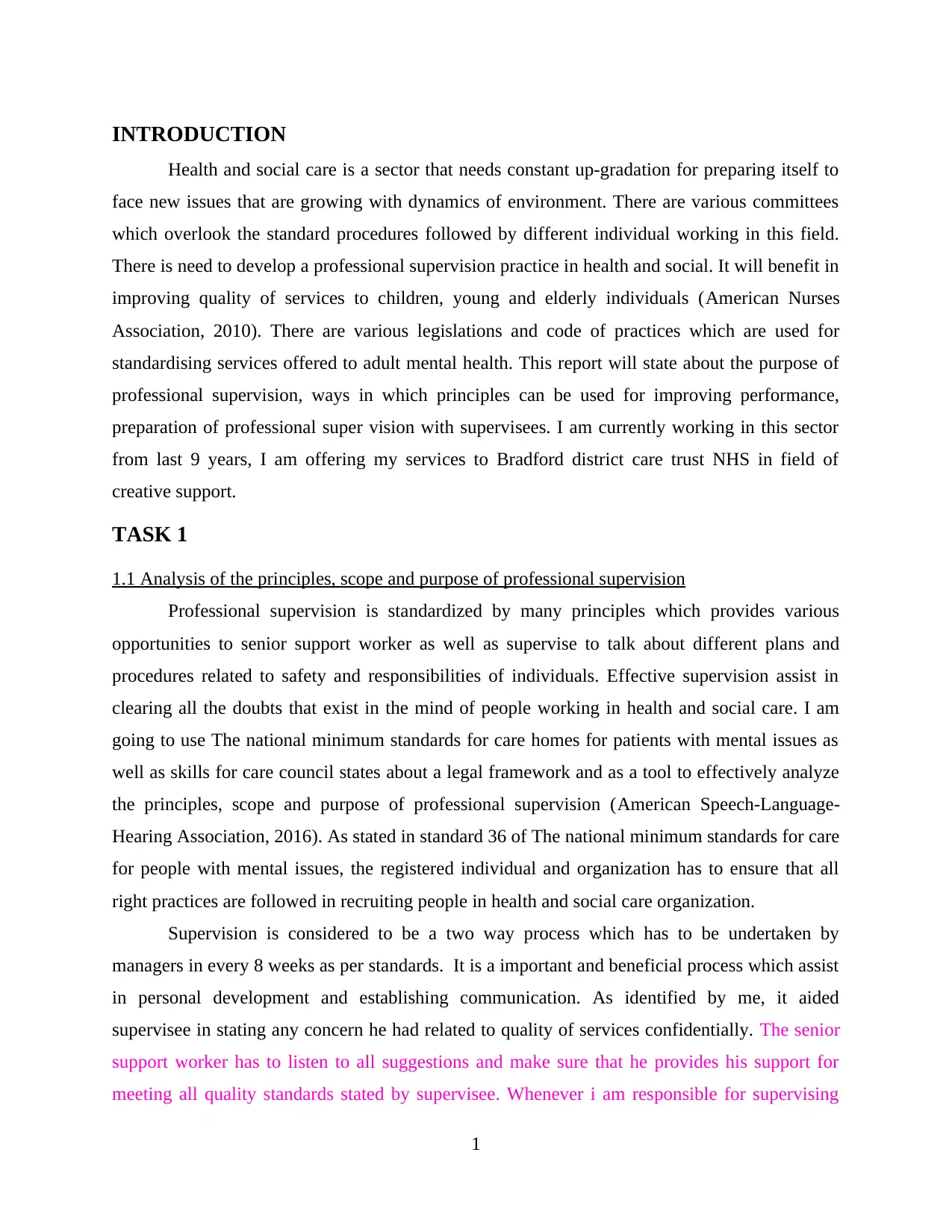
INTRODUCTION
Health and social care is a sector that needs constant up-gradation for preparing itself to
face new issues that are growing with dynamics of environment. There are various committees
which overlook the standard procedures followed by different individual working in this field.
There is need to develop a professional supervision practice in health and social. It will benefit in
improving quality of services to children, young and elderly individuals (American Nurses
Association, 2010). There are various legislations and code of practices which are used for
standardising services offered to adult mental health. This report will state about the purpose of
professional supervision, ways in which principles can be used for improving performance,
preparation of professional super vision with supervisees. I am currently working in this sector
from last 9 years, I am offering my services to Bradford district care trust NHS in field of
creative support.
TASK 1
1.1 Analysis of the principles, scope and purpose of professional supervision
Professional supervision is standardized by many principles which provides various
opportunities to senior support worker as well as supervise to talk about different plans and
procedures related to safety and responsibilities of individuals. Effective supervision assist in
clearing all the doubts that exist in the mind of people working in health and social care. I am
going to use The national minimum standards for care homes for patients with mental issues as
well as skills for care council states about a legal framework and as a tool to effectively analyze
the principles, scope and purpose of professional supervision (American Speech-Language-
Hearing Association, 2016). As stated in standard 36 of The national minimum standards for care
for people with mental issues, the registered individual and organization has to ensure that all
right practices are followed in recruiting people in health and social care organization.
Supervision is considered to be a two way process which has to be undertaken by
managers in every 8 weeks as per standards. It is a important and beneficial process which assist
in personal development and establishing communication. As identified by me, it aided
supervisee in stating any concern he had related to quality of services confidentially. The senior
support worker has to listen to all suggestions and make sure that he provides his support for
meeting all quality standards stated by supervisee. Whenever i am responsible for supervising
1
Health and social care is a sector that needs constant up-gradation for preparing itself to
face new issues that are growing with dynamics of environment. There are various committees
which overlook the standard procedures followed by different individual working in this field.
There is need to develop a professional supervision practice in health and social. It will benefit in
improving quality of services to children, young and elderly individuals (American Nurses
Association, 2010). There are various legislations and code of practices which are used for
standardising services offered to adult mental health. This report will state about the purpose of
professional supervision, ways in which principles can be used for improving performance,
preparation of professional super vision with supervisees. I am currently working in this sector
from last 9 years, I am offering my services to Bradford district care trust NHS in field of
creative support.
TASK 1
1.1 Analysis of the principles, scope and purpose of professional supervision
Professional supervision is standardized by many principles which provides various
opportunities to senior support worker as well as supervise to talk about different plans and
procedures related to safety and responsibilities of individuals. Effective supervision assist in
clearing all the doubts that exist in the mind of people working in health and social care. I am
going to use The national minimum standards for care homes for patients with mental issues as
well as skills for care council states about a legal framework and as a tool to effectively analyze
the principles, scope and purpose of professional supervision (American Speech-Language-
Hearing Association, 2016). As stated in standard 36 of The national minimum standards for care
for people with mental issues, the registered individual and organization has to ensure that all
right practices are followed in recruiting people in health and social care organization.
Supervision is considered to be a two way process which has to be undertaken by
managers in every 8 weeks as per standards. It is a important and beneficial process which assist
in personal development and establishing communication. As identified by me, it aided
supervisee in stating any concern he had related to quality of services confidentially. The senior
support worker has to listen to all suggestions and make sure that he provides his support for
meeting all quality standards stated by supervisee. Whenever i am responsible for supervising
1
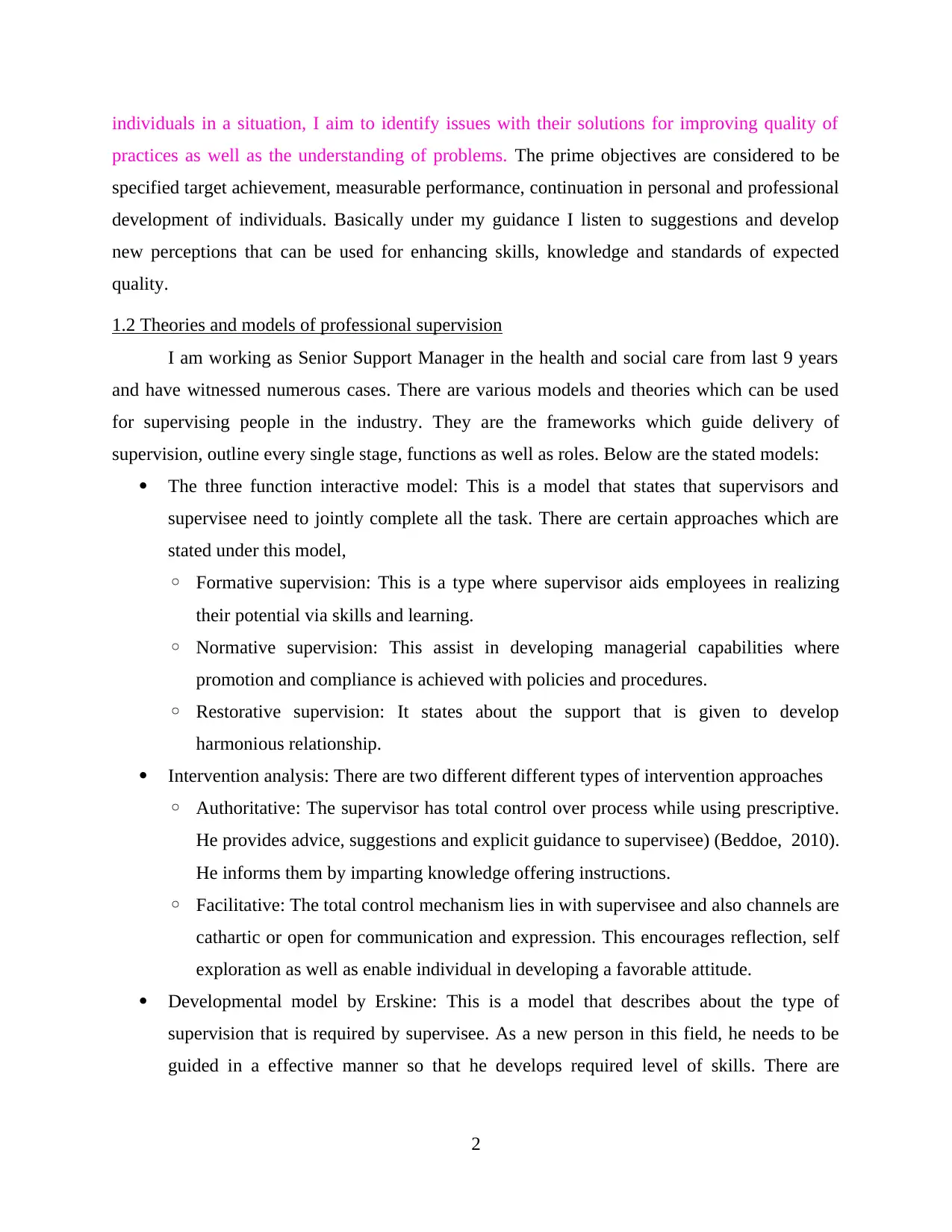
individuals in a situation, I aim to identify issues with their solutions for improving quality of
practices as well as the understanding of problems. The prime objectives are considered to be
specified target achievement, measurable performance, continuation in personal and professional
development of individuals. Basically under my guidance I listen to suggestions and develop
new perceptions that can be used for enhancing skills, knowledge and standards of expected
quality.
1.2 Theories and models of professional supervision
I am working as Senior Support Manager in the health and social care from last 9 years
and have witnessed numerous cases. There are various models and theories which can be used
for supervising people in the industry. They are the frameworks which guide delivery of
supervision, outline every single stage, functions as well as roles. Below are the stated models:
The three function interactive model: This is a model that states that supervisors and
supervisee need to jointly complete all the task. There are certain approaches which are
stated under this model,
◦ Formative supervision: This is a type where supervisor aids employees in realizing
their potential via skills and learning.
◦ Normative supervision: This assist in developing managerial capabilities where
promotion and compliance is achieved with policies and procedures.
◦ Restorative supervision: It states about the support that is given to develop
harmonious relationship.
Intervention analysis: There are two different different types of intervention approaches
◦ Authoritative: The supervisor has total control over process while using prescriptive.
He provides advice, suggestions and explicit guidance to supervisee) (Beddoe, 2010).
He informs them by imparting knowledge offering instructions.
◦ Facilitative: The total control mechanism lies in with supervisee and also channels are
cathartic or open for communication and expression. This encourages reflection, self
exploration as well as enable individual in developing a favorable attitude.
Developmental model by Erskine: This is a model that describes about the type of
supervision that is required by supervisee. As a new person in this field, he needs to be
guided in a effective manner so that he develops required level of skills. There are
2
practices as well as the understanding of problems. The prime objectives are considered to be
specified target achievement, measurable performance, continuation in personal and professional
development of individuals. Basically under my guidance I listen to suggestions and develop
new perceptions that can be used for enhancing skills, knowledge and standards of expected
quality.
1.2 Theories and models of professional supervision
I am working as Senior Support Manager in the health and social care from last 9 years
and have witnessed numerous cases. There are various models and theories which can be used
for supervising people in the industry. They are the frameworks which guide delivery of
supervision, outline every single stage, functions as well as roles. Below are the stated models:
The three function interactive model: This is a model that states that supervisors and
supervisee need to jointly complete all the task. There are certain approaches which are
stated under this model,
◦ Formative supervision: This is a type where supervisor aids employees in realizing
their potential via skills and learning.
◦ Normative supervision: This assist in developing managerial capabilities where
promotion and compliance is achieved with policies and procedures.
◦ Restorative supervision: It states about the support that is given to develop
harmonious relationship.
Intervention analysis: There are two different different types of intervention approaches
◦ Authoritative: The supervisor has total control over process while using prescriptive.
He provides advice, suggestions and explicit guidance to supervisee) (Beddoe, 2010).
He informs them by imparting knowledge offering instructions.
◦ Facilitative: The total control mechanism lies in with supervisee and also channels are
cathartic or open for communication and expression. This encourages reflection, self
exploration as well as enable individual in developing a favorable attitude.
Developmental model by Erskine: This is a model that describes about the type of
supervision that is required by supervisee. As a new person in this field, he needs to be
guided in a effective manner so that he develops required level of skills. There are
2
⊘ This is a preview!⊘
Do you want full access?
Subscribe today to unlock all pages.

Trusted by 1+ million students worldwide
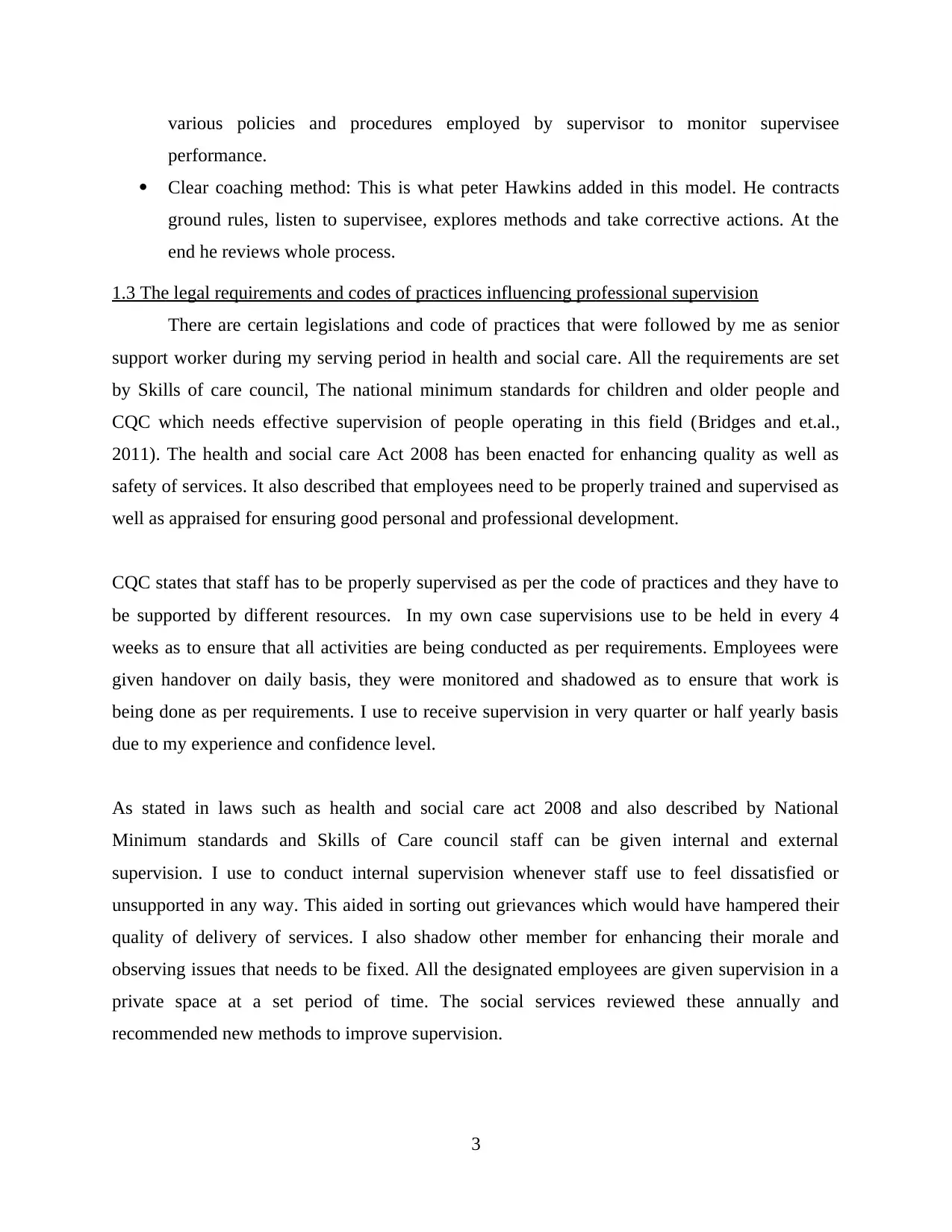
various policies and procedures employed by supervisor to monitor supervisee
performance.
Clear coaching method: This is what peter Hawkins added in this model. He contracts
ground rules, listen to supervisee, explores methods and take corrective actions. At the
end he reviews whole process.
1.3 The legal requirements and codes of practices influencing professional supervision
There are certain legislations and code of practices that were followed by me as senior
support worker during my serving period in health and social care. All the requirements are set
by Skills of care council, The national minimum standards for children and older people and
CQC which needs effective supervision of people operating in this field (Bridges and et.al.,
2011). The health and social care Act 2008 has been enacted for enhancing quality as well as
safety of services. It also described that employees need to be properly trained and supervised as
well as appraised for ensuring good personal and professional development.
CQC states that staff has to be properly supervised as per the code of practices and they have to
be supported by different resources. In my own case supervisions use to be held in every 4
weeks as to ensure that all activities are being conducted as per requirements. Employees were
given handover on daily basis, they were monitored and shadowed as to ensure that work is
being done as per requirements. I use to receive supervision in very quarter or half yearly basis
due to my experience and confidence level.
As stated in laws such as health and social care act 2008 and also described by National
Minimum standards and Skills of Care council staff can be given internal and external
supervision. I use to conduct internal supervision whenever staff use to feel dissatisfied or
unsupported in any way. This aided in sorting out grievances which would have hampered their
quality of delivery of services. I also shadow other member for enhancing their morale and
observing issues that needs to be fixed. All the designated employees are given supervision in a
private space at a set period of time. The social services reviewed these annually and
recommended new methods to improve supervision.
3
performance.
Clear coaching method: This is what peter Hawkins added in this model. He contracts
ground rules, listen to supervisee, explores methods and take corrective actions. At the
end he reviews whole process.
1.3 The legal requirements and codes of practices influencing professional supervision
There are certain legislations and code of practices that were followed by me as senior
support worker during my serving period in health and social care. All the requirements are set
by Skills of care council, The national minimum standards for children and older people and
CQC which needs effective supervision of people operating in this field (Bridges and et.al.,
2011). The health and social care Act 2008 has been enacted for enhancing quality as well as
safety of services. It also described that employees need to be properly trained and supervised as
well as appraised for ensuring good personal and professional development.
CQC states that staff has to be properly supervised as per the code of practices and they have to
be supported by different resources. In my own case supervisions use to be held in every 4
weeks as to ensure that all activities are being conducted as per requirements. Employees were
given handover on daily basis, they were monitored and shadowed as to ensure that work is
being done as per requirements. I use to receive supervision in very quarter or half yearly basis
due to my experience and confidence level.
As stated in laws such as health and social care act 2008 and also described by National
Minimum standards and Skills of Care council staff can be given internal and external
supervision. I use to conduct internal supervision whenever staff use to feel dissatisfied or
unsupported in any way. This aided in sorting out grievances which would have hampered their
quality of delivery of services. I also shadow other member for enhancing their morale and
observing issues that needs to be fixed. All the designated employees are given supervision in a
private space at a set period of time. The social services reviewed these annually and
recommended new methods to improve supervision.
3
Paraphrase This Document
Need a fresh take? Get an instant paraphrase of this document with our AI Paraphraser
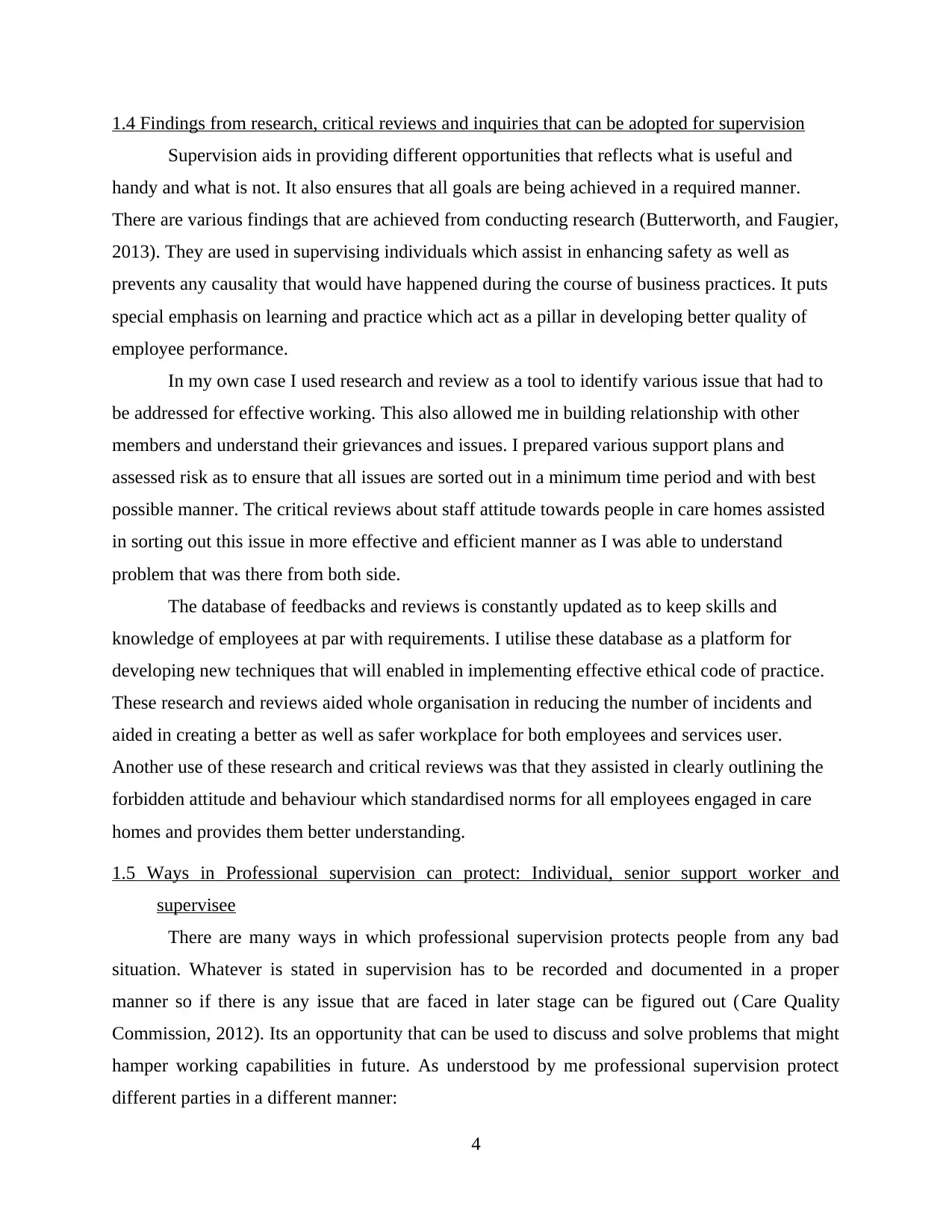
1.4 Findings from research, critical reviews and inquiries that can be adopted for supervision
Supervision aids in providing different opportunities that reflects what is useful and
handy and what is not. It also ensures that all goals are being achieved in a required manner.
There are various findings that are achieved from conducting research (Butterworth, and Faugier,
2013). They are used in supervising individuals which assist in enhancing safety as well as
prevents any causality that would have happened during the course of business practices. It puts
special emphasis on learning and practice which act as a pillar in developing better quality of
employee performance.
In my own case I used research and review as a tool to identify various issue that had to
be addressed for effective working. This also allowed me in building relationship with other
members and understand their grievances and issues. I prepared various support plans and
assessed risk as to ensure that all issues are sorted out in a minimum time period and with best
possible manner. The critical reviews about staff attitude towards people in care homes assisted
in sorting out this issue in more effective and efficient manner as I was able to understand
problem that was there from both side.
The database of feedbacks and reviews is constantly updated as to keep skills and
knowledge of employees at par with requirements. I utilise these database as a platform for
developing new techniques that will enabled in implementing effective ethical code of practice.
These research and reviews aided whole organisation in reducing the number of incidents and
aided in creating a better as well as safer workplace for both employees and services user.
Another use of these research and critical reviews was that they assisted in clearly outlining the
forbidden attitude and behaviour which standardised norms for all employees engaged in care
homes and provides them better understanding.
1.5 Ways in Professional supervision can protect: Individual, senior support worker and
supervisee
There are many ways in which professional supervision protects people from any bad
situation. Whatever is stated in supervision has to be recorded and documented in a proper
manner so if there is any issue that are faced in later stage can be figured out ( Care Quality
Commission, 2012). Its an opportunity that can be used to discuss and solve problems that might
hamper working capabilities in future. As understood by me professional supervision protect
different parties in a different manner:
4
Supervision aids in providing different opportunities that reflects what is useful and
handy and what is not. It also ensures that all goals are being achieved in a required manner.
There are various findings that are achieved from conducting research (Butterworth, and Faugier,
2013). They are used in supervising individuals which assist in enhancing safety as well as
prevents any causality that would have happened during the course of business practices. It puts
special emphasis on learning and practice which act as a pillar in developing better quality of
employee performance.
In my own case I used research and review as a tool to identify various issue that had to
be addressed for effective working. This also allowed me in building relationship with other
members and understand their grievances and issues. I prepared various support plans and
assessed risk as to ensure that all issues are sorted out in a minimum time period and with best
possible manner. The critical reviews about staff attitude towards people in care homes assisted
in sorting out this issue in more effective and efficient manner as I was able to understand
problem that was there from both side.
The database of feedbacks and reviews is constantly updated as to keep skills and
knowledge of employees at par with requirements. I utilise these database as a platform for
developing new techniques that will enabled in implementing effective ethical code of practice.
These research and reviews aided whole organisation in reducing the number of incidents and
aided in creating a better as well as safer workplace for both employees and services user.
Another use of these research and critical reviews was that they assisted in clearly outlining the
forbidden attitude and behaviour which standardised norms for all employees engaged in care
homes and provides them better understanding.
1.5 Ways in Professional supervision can protect: Individual, senior support worker and
supervisee
There are many ways in which professional supervision protects people from any bad
situation. Whatever is stated in supervision has to be recorded and documented in a proper
manner so if there is any issue that are faced in later stage can be figured out ( Care Quality
Commission, 2012). Its an opportunity that can be used to discuss and solve problems that might
hamper working capabilities in future. As understood by me professional supervision protect
different parties in a different manner:
4
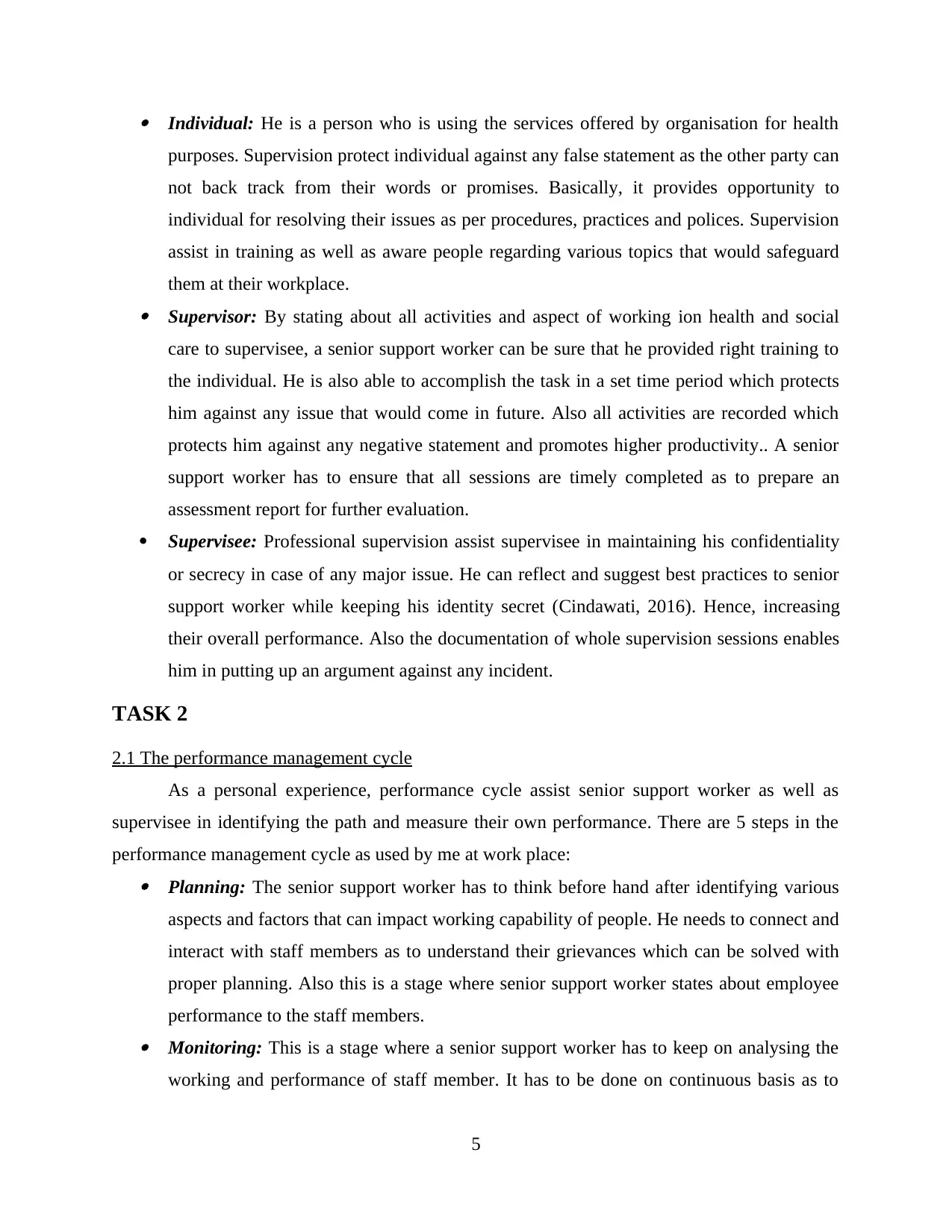
Individual: He is a person who is using the services offered by organisation for health
purposes. Supervision protect individual against any false statement as the other party can
not back track from their words or promises. Basically, it provides opportunity to
individual for resolving their issues as per procedures, practices and polices. Supervision
assist in training as well as aware people regarding various topics that would safeguard
them at their workplace. Supervisor: By stating about all activities and aspect of working ion health and social
care to supervisee, a senior support worker can be sure that he provided right training to
the individual. He is also able to accomplish the task in a set time period which protects
him against any issue that would come in future. Also all activities are recorded which
protects him against any negative statement and promotes higher productivity.. A senior
support worker has to ensure that all sessions are timely completed as to prepare an
assessment report for further evaluation.
Supervisee: Professional supervision assist supervisee in maintaining his confidentiality
or secrecy in case of any major issue. He can reflect and suggest best practices to senior
support worker while keeping his identity secret (Cindawati, 2016). Hence, increasing
their overall performance. Also the documentation of whole supervision sessions enables
him in putting up an argument against any incident.
TASK 2
2.1 The performance management cycle
As a personal experience, performance cycle assist senior support worker as well as
supervisee in identifying the path and measure their own performance. There are 5 steps in the
performance management cycle as used by me at work place: Planning: The senior support worker has to think before hand after identifying various
aspects and factors that can impact working capability of people. He needs to connect and
interact with staff members as to understand their grievances which can be solved with
proper planning. Also this is a stage where senior support worker states about employee
performance to the staff members. Monitoring: This is a stage where a senior support worker has to keep on analysing the
working and performance of staff member. It has to be done on continuous basis as to
5
purposes. Supervision protect individual against any false statement as the other party can
not back track from their words or promises. Basically, it provides opportunity to
individual for resolving their issues as per procedures, practices and polices. Supervision
assist in training as well as aware people regarding various topics that would safeguard
them at their workplace. Supervisor: By stating about all activities and aspect of working ion health and social
care to supervisee, a senior support worker can be sure that he provided right training to
the individual. He is also able to accomplish the task in a set time period which protects
him against any issue that would come in future. Also all activities are recorded which
protects him against any negative statement and promotes higher productivity.. A senior
support worker has to ensure that all sessions are timely completed as to prepare an
assessment report for further evaluation.
Supervisee: Professional supervision assist supervisee in maintaining his confidentiality
or secrecy in case of any major issue. He can reflect and suggest best practices to senior
support worker while keeping his identity secret (Cindawati, 2016). Hence, increasing
their overall performance. Also the documentation of whole supervision sessions enables
him in putting up an argument against any incident.
TASK 2
2.1 The performance management cycle
As a personal experience, performance cycle assist senior support worker as well as
supervisee in identifying the path and measure their own performance. There are 5 steps in the
performance management cycle as used by me at work place: Planning: The senior support worker has to think before hand after identifying various
aspects and factors that can impact working capability of people. He needs to connect and
interact with staff members as to understand their grievances which can be solved with
proper planning. Also this is a stage where senior support worker states about employee
performance to the staff members. Monitoring: This is a stage where a senior support worker has to keep on analysing the
working and performance of staff member. It has to be done on continuous basis as to
5
⊘ This is a preview!⊘
Do you want full access?
Subscribe today to unlock all pages.

Trusted by 1+ million students worldwide
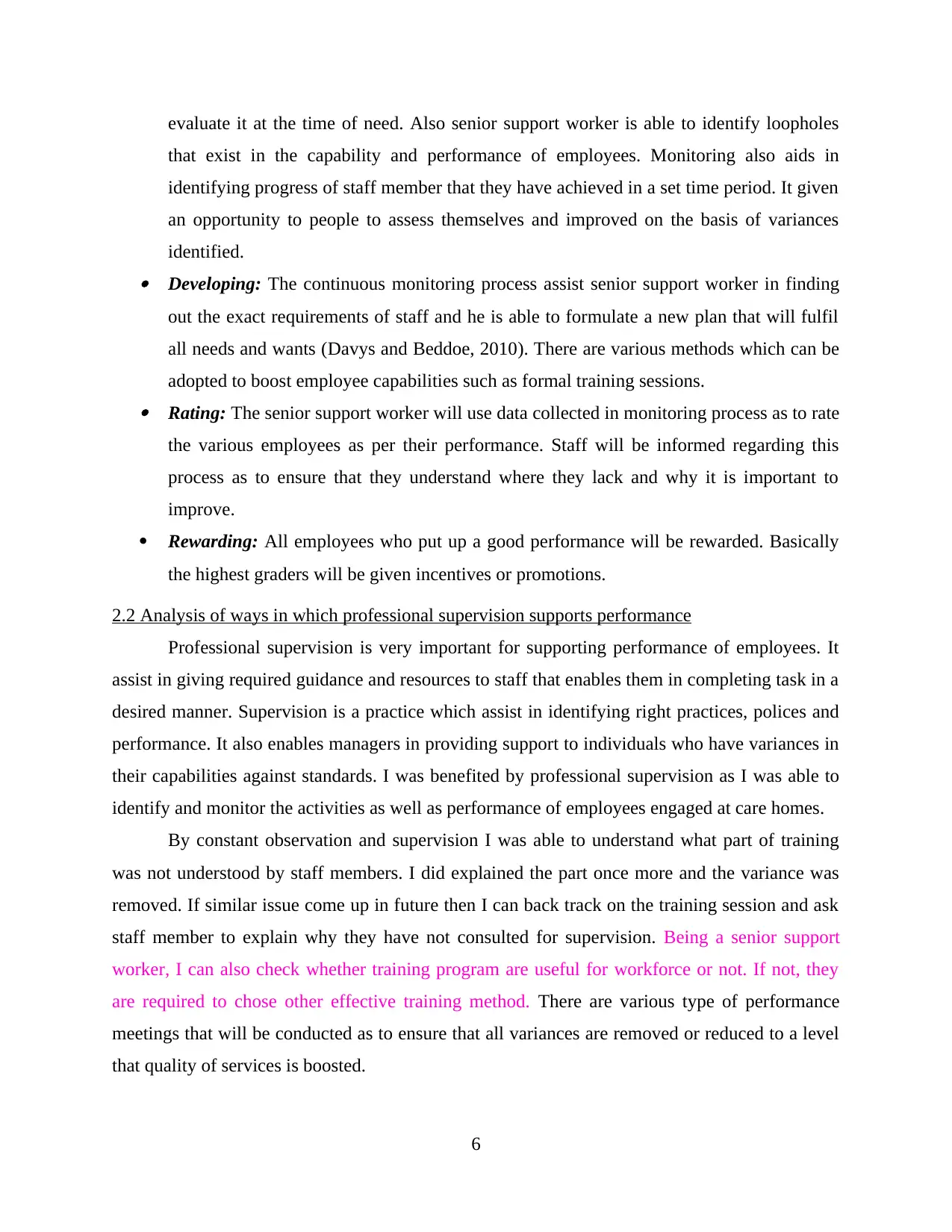
evaluate it at the time of need. Also senior support worker is able to identify loopholes
that exist in the capability and performance of employees. Monitoring also aids in
identifying progress of staff member that they have achieved in a set time period. It given
an opportunity to people to assess themselves and improved on the basis of variances
identified. Developing: The continuous monitoring process assist senior support worker in finding
out the exact requirements of staff and he is able to formulate a new plan that will fulfil
all needs and wants (Davys and Beddoe, 2010). There are various methods which can be
adopted to boost employee capabilities such as formal training sessions. Rating: The senior support worker will use data collected in monitoring process as to rate
the various employees as per their performance. Staff will be informed regarding this
process as to ensure that they understand where they lack and why it is important to
improve.
Rewarding: All employees who put up a good performance will be rewarded. Basically
the highest graders will be given incentives or promotions.
2.2 Analysis of ways in which professional supervision supports performance
Professional supervision is very important for supporting performance of employees. It
assist in giving required guidance and resources to staff that enables them in completing task in a
desired manner. Supervision is a practice which assist in identifying right practices, polices and
performance. It also enables managers in providing support to individuals who have variances in
their capabilities against standards. I was benefited by professional supervision as I was able to
identify and monitor the activities as well as performance of employees engaged at care homes.
By constant observation and supervision I was able to understand what part of training
was not understood by staff members. I did explained the part once more and the variance was
removed. If similar issue come up in future then I can back track on the training session and ask
staff member to explain why they have not consulted for supervision. Being a senior support
worker, I can also check whether training program are useful for workforce or not. If not, they
are required to chose other effective training method. There are various type of performance
meetings that will be conducted as to ensure that all variances are removed or reduced to a level
that quality of services is boosted.
6
that exist in the capability and performance of employees. Monitoring also aids in
identifying progress of staff member that they have achieved in a set time period. It given
an opportunity to people to assess themselves and improved on the basis of variances
identified. Developing: The continuous monitoring process assist senior support worker in finding
out the exact requirements of staff and he is able to formulate a new plan that will fulfil
all needs and wants (Davys and Beddoe, 2010). There are various methods which can be
adopted to boost employee capabilities such as formal training sessions. Rating: The senior support worker will use data collected in monitoring process as to rate
the various employees as per their performance. Staff will be informed regarding this
process as to ensure that they understand where they lack and why it is important to
improve.
Rewarding: All employees who put up a good performance will be rewarded. Basically
the highest graders will be given incentives or promotions.
2.2 Analysis of ways in which professional supervision supports performance
Professional supervision is very important for supporting performance of employees. It
assist in giving required guidance and resources to staff that enables them in completing task in a
desired manner. Supervision is a practice which assist in identifying right practices, polices and
performance. It also enables managers in providing support to individuals who have variances in
their capabilities against standards. I was benefited by professional supervision as I was able to
identify and monitor the activities as well as performance of employees engaged at care homes.
By constant observation and supervision I was able to understand what part of training
was not understood by staff members. I did explained the part once more and the variance was
removed. If similar issue come up in future then I can back track on the training session and ask
staff member to explain why they have not consulted for supervision. Being a senior support
worker, I can also check whether training program are useful for workforce or not. If not, they
are required to chose other effective training method. There are various type of performance
meetings that will be conducted as to ensure that all variances are removed or reduced to a level
that quality of services is boosted.
6
Paraphrase This Document
Need a fresh take? Get an instant paraphrase of this document with our AI Paraphraser
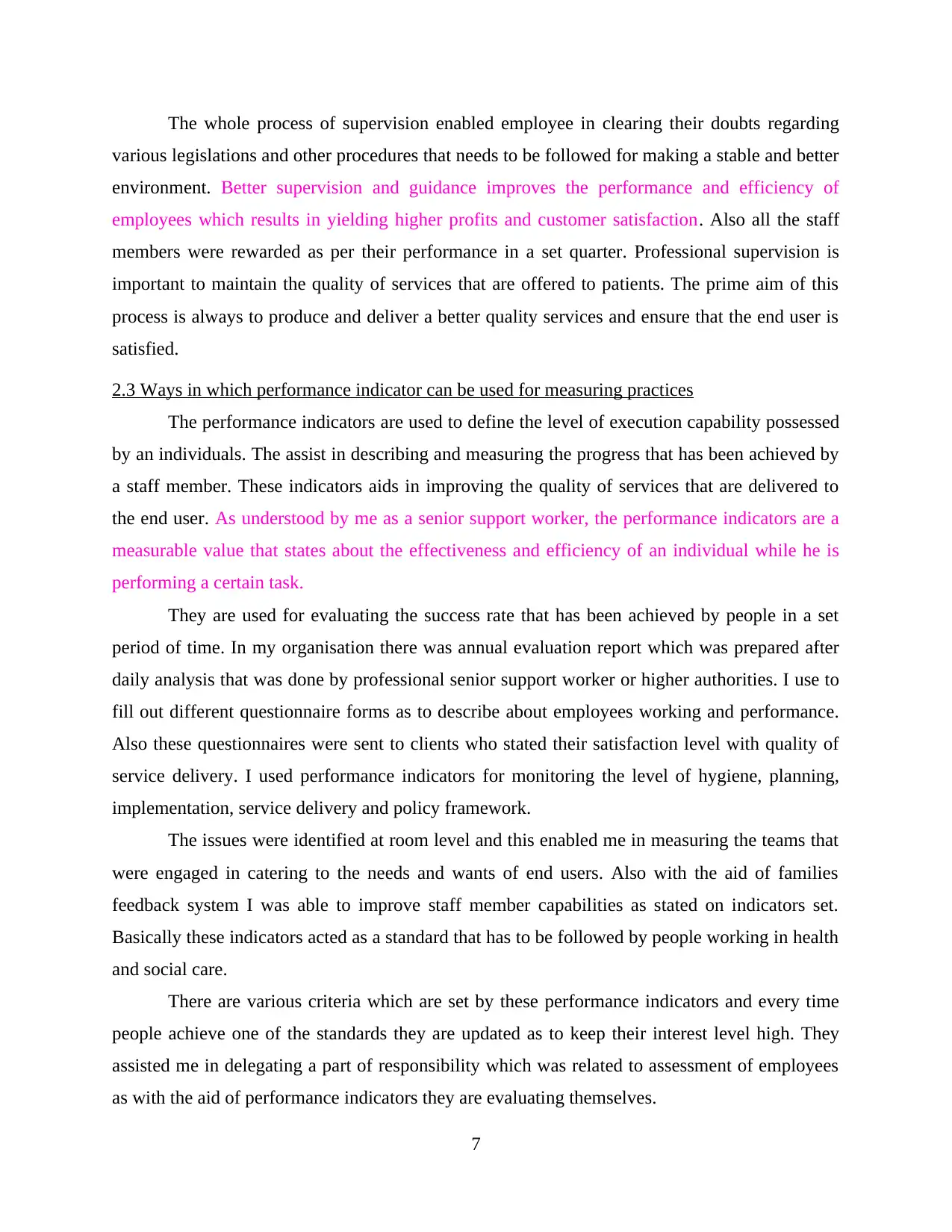
The whole process of supervision enabled employee in clearing their doubts regarding
various legislations and other procedures that needs to be followed for making a stable and better
environment. Better supervision and guidance improves the performance and efficiency of
employees which results in yielding higher profits and customer satisfaction. Also all the staff
members were rewarded as per their performance in a set quarter. Professional supervision is
important to maintain the quality of services that are offered to patients. The prime aim of this
process is always to produce and deliver a better quality services and ensure that the end user is
satisfied.
2.3 Ways in which performance indicator can be used for measuring practices
The performance indicators are used to define the level of execution capability possessed
by an individuals. The assist in describing and measuring the progress that has been achieved by
a staff member. These indicators aids in improving the quality of services that are delivered to
the end user. As understood by me as a senior support worker, the performance indicators are a
measurable value that states about the effectiveness and efficiency of an individual while he is
performing a certain task.
They are used for evaluating the success rate that has been achieved by people in a set
period of time. In my organisation there was annual evaluation report which was prepared after
daily analysis that was done by professional senior support worker or higher authorities. I use to
fill out different questionnaire forms as to describe about employees working and performance.
Also these questionnaires were sent to clients who stated their satisfaction level with quality of
service delivery. I used performance indicators for monitoring the level of hygiene, planning,
implementation, service delivery and policy framework.
The issues were identified at room level and this enabled me in measuring the teams that
were engaged in catering to the needs and wants of end users. Also with the aid of families
feedback system I was able to improve staff member capabilities as stated on indicators set.
Basically these indicators acted as a standard that has to be followed by people working in health
and social care.
There are various criteria which are set by these performance indicators and every time
people achieve one of the standards they are updated as to keep their interest level high. They
assisted me in delegating a part of responsibility which was related to assessment of employees
as with the aid of performance indicators they are evaluating themselves.
7
various legislations and other procedures that needs to be followed for making a stable and better
environment. Better supervision and guidance improves the performance and efficiency of
employees which results in yielding higher profits and customer satisfaction. Also all the staff
members were rewarded as per their performance in a set quarter. Professional supervision is
important to maintain the quality of services that are offered to patients. The prime aim of this
process is always to produce and deliver a better quality services and ensure that the end user is
satisfied.
2.3 Ways in which performance indicator can be used for measuring practices
The performance indicators are used to define the level of execution capability possessed
by an individuals. The assist in describing and measuring the progress that has been achieved by
a staff member. These indicators aids in improving the quality of services that are delivered to
the end user. As understood by me as a senior support worker, the performance indicators are a
measurable value that states about the effectiveness and efficiency of an individual while he is
performing a certain task.
They are used for evaluating the success rate that has been achieved by people in a set
period of time. In my organisation there was annual evaluation report which was prepared after
daily analysis that was done by professional senior support worker or higher authorities. I use to
fill out different questionnaire forms as to describe about employees working and performance.
Also these questionnaires were sent to clients who stated their satisfaction level with quality of
service delivery. I used performance indicators for monitoring the level of hygiene, planning,
implementation, service delivery and policy framework.
The issues were identified at room level and this enabled me in measuring the teams that
were engaged in catering to the needs and wants of end users. Also with the aid of families
feedback system I was able to improve staff member capabilities as stated on indicators set.
Basically these indicators acted as a standard that has to be followed by people working in health
and social care.
There are various criteria which are set by these performance indicators and every time
people achieve one of the standards they are updated as to keep their interest level high. They
assisted me in delegating a part of responsibility which was related to assessment of employees
as with the aid of performance indicators they are evaluating themselves.
7
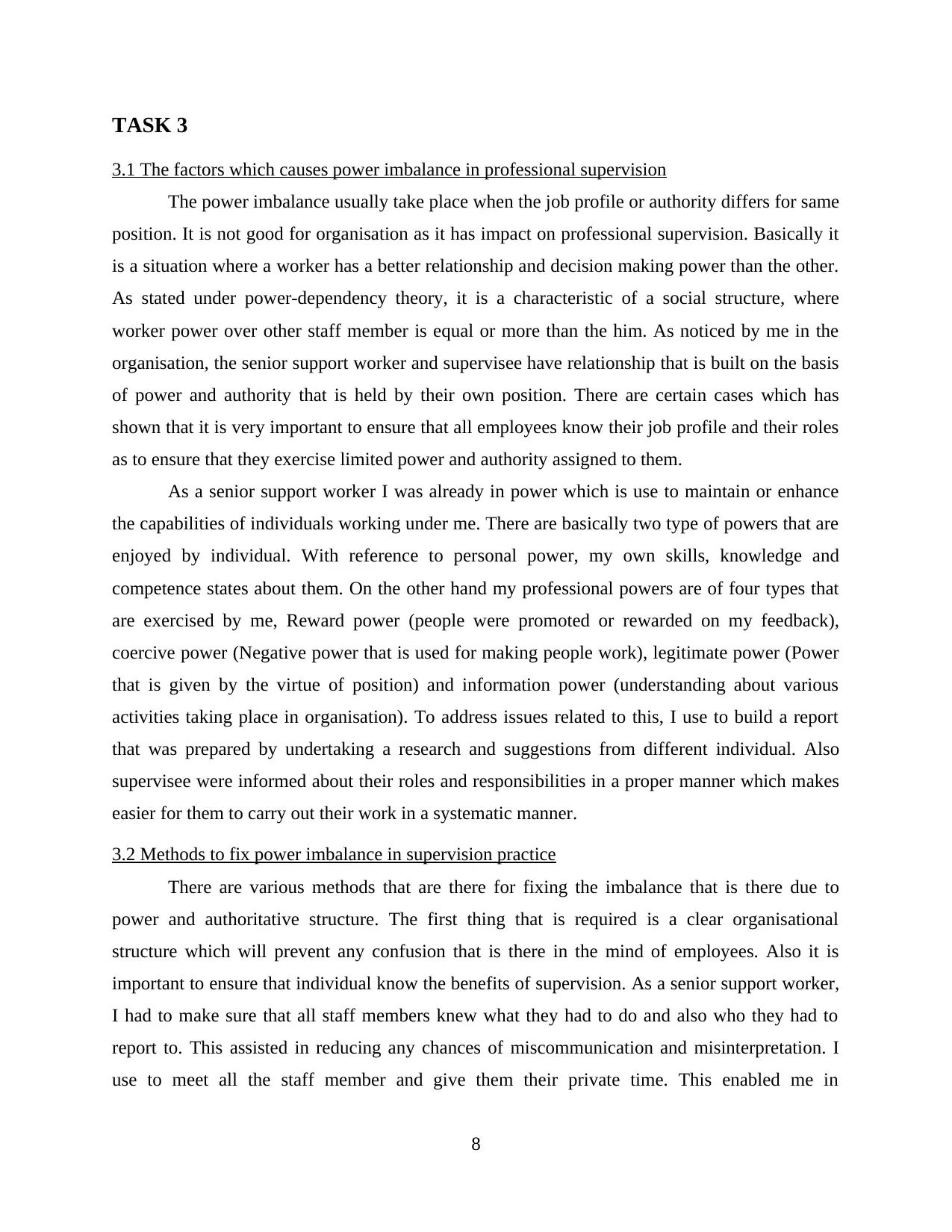
TASK 3
3.1 The factors which causes power imbalance in professional supervision
The power imbalance usually take place when the job profile or authority differs for same
position. It is not good for organisation as it has impact on professional supervision. Basically it
is a situation where a worker has a better relationship and decision making power than the other.
As stated under power-dependency theory, it is a characteristic of a social structure, where
worker power over other staff member is equal or more than the him. As noticed by me in the
organisation, the senior support worker and supervisee have relationship that is built on the basis
of power and authority that is held by their own position. There are certain cases which has
shown that it is very important to ensure that all employees know their job profile and their roles
as to ensure that they exercise limited power and authority assigned to them.
As a senior support worker I was already in power which is use to maintain or enhance
the capabilities of individuals working under me. There are basically two type of powers that are
enjoyed by individual. With reference to personal power, my own skills, knowledge and
competence states about them. On the other hand my professional powers are of four types that
are exercised by me, Reward power (people were promoted or rewarded on my feedback),
coercive power (Negative power that is used for making people work), legitimate power (Power
that is given by the virtue of position) and information power (understanding about various
activities taking place in organisation). To address issues related to this, I use to build a report
that was prepared by undertaking a research and suggestions from different individual. Also
supervisee were informed about their roles and responsibilities in a proper manner which makes
easier for them to carry out their work in a systematic manner.
3.2 Methods to fix power imbalance in supervision practice
There are various methods that are there for fixing the imbalance that is there due to
power and authoritative structure. The first thing that is required is a clear organisational
structure which will prevent any confusion that is there in the mind of employees. Also it is
important to ensure that individual know the benefits of supervision. As a senior support worker,
I had to make sure that all staff members knew what they had to do and also who they had to
report to. This assisted in reducing any chances of miscommunication and misinterpretation. I
use to meet all the staff member and give them their private time. This enabled me in
8
3.1 The factors which causes power imbalance in professional supervision
The power imbalance usually take place when the job profile or authority differs for same
position. It is not good for organisation as it has impact on professional supervision. Basically it
is a situation where a worker has a better relationship and decision making power than the other.
As stated under power-dependency theory, it is a characteristic of a social structure, where
worker power over other staff member is equal or more than the him. As noticed by me in the
organisation, the senior support worker and supervisee have relationship that is built on the basis
of power and authority that is held by their own position. There are certain cases which has
shown that it is very important to ensure that all employees know their job profile and their roles
as to ensure that they exercise limited power and authority assigned to them.
As a senior support worker I was already in power which is use to maintain or enhance
the capabilities of individuals working under me. There are basically two type of powers that are
enjoyed by individual. With reference to personal power, my own skills, knowledge and
competence states about them. On the other hand my professional powers are of four types that
are exercised by me, Reward power (people were promoted or rewarded on my feedback),
coercive power (Negative power that is used for making people work), legitimate power (Power
that is given by the virtue of position) and information power (understanding about various
activities taking place in organisation). To address issues related to this, I use to build a report
that was prepared by undertaking a research and suggestions from different individual. Also
supervisee were informed about their roles and responsibilities in a proper manner which makes
easier for them to carry out their work in a systematic manner.
3.2 Methods to fix power imbalance in supervision practice
There are various methods that are there for fixing the imbalance that is there due to
power and authoritative structure. The first thing that is required is a clear organisational
structure which will prevent any confusion that is there in the mind of employees. Also it is
important to ensure that individual know the benefits of supervision. As a senior support worker,
I had to make sure that all staff members knew what they had to do and also who they had to
report to. This assisted in reducing any chances of miscommunication and misinterpretation. I
use to meet all the staff member and give them their private time. This enabled me in
8
⊘ This is a preview!⊘
Do you want full access?
Subscribe today to unlock all pages.

Trusted by 1+ million students worldwide
1 out of 27
Related Documents
Your All-in-One AI-Powered Toolkit for Academic Success.
+13062052269
info@desklib.com
Available 24*7 on WhatsApp / Email
![[object Object]](/_next/static/media/star-bottom.7253800d.svg)
Unlock your academic potential
Copyright © 2020–2026 A2Z Services. All Rights Reserved. Developed and managed by ZUCOL.



